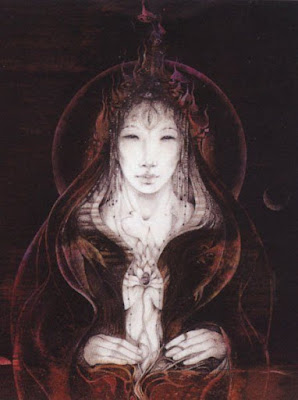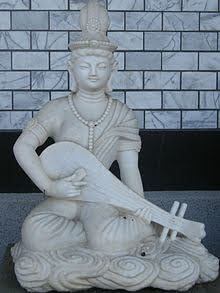Benzaiten is the only female of the seven fortunate gods, and she is as much a Buddhist as she is a Shinto deity.
Actors, airline hostesses, artists, beauticians, composers, dancers, designers, directors, dramatists, entertainers, gamblers, models, musicians, painters, photographers, sculptors, sword makers, and writers are among the jobs Chiba associated with her.
Author Brian Bocking compares Benzaiten to Ichikishima-hime-no-mikoto, the principal deity of the Enoshima Jinja's three major temples.
Benzaiten is named after the Hindu goddess Sarasvati, and it is derived from Chinese translations of
Buddhist sutras.
Sarasvati is the Hindu Goddess of wisdom, music, and the arts, and she is claimed to have been the wife of
Brahma and
Vishnu, who along with
Siva make up Hinduism's sacred trinity.
Sarasvati is first mentioned in the Rig Veda, one of Hinduism's four holy books, which was compiled between 1500 and 1000 BC.
This phrase from Hymn 41 is arguably the most appropriate in the Benzaiten context:
Sarasvat, greatest Mother, best of Rivers, best of Goddesses We have no notoriety, as it were, and dear Mother, grant us renown.
All generations have a home in thee, Sarasvat, heavenly.
Benzaiten Jinja in Japan are virtually all located near the sea, rivers, or lakes, or have their own in-ground lakes.
The next sentence from Hymn 61 makes a more dubious allusion to Banzaiten:
Yes, this exquisite Sarasvat, with her golden road, is dreadful.
Our eulogy refers to you as a foe-slayer.
Sarasvati's "foe-slayer" might be understood as a reference to Sarasvati's killing of Vritra, the Hindu mythology's three-headed serpent/snake.
However, there is no further mention of this, and the conventional story puts Indra as Vritra's killer.
The three-headed serpent/snake transforms into a white snake in the Benzaiten mythology, which acts as her messenger.
The Kami-shinmei-tenso Jinja is a nice example of this.
The Most Important Shrines Dedicated To Goddess Banzaiten



























